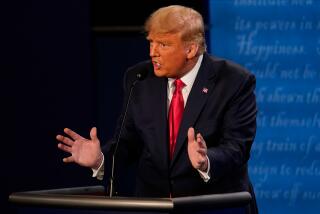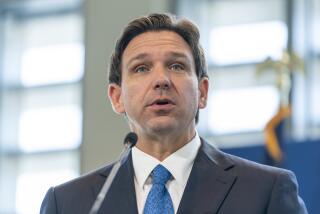CONSIDERING APPEAL : LUCAS LOSES AGAIN IN ‘STAR WARS’ SUIT
- Share via
George Lucas, who is known for staging technically dazzling space battles in his movies, hasn’t given up his fight to prevent the use of the term Star Wars in describing President Reagan’s Strategic Defense Initiative (SDI).
The film maker lost the second round in his battle Tuesday when a federal district court judge ruled in a 10-page opinion that although the term Star Wars is indeed a trademark owned by Lucas, the courts cannot prohibit use of the term to describe SDI. “When politicians, newspapers and the public generally use the phrase ‘Star Wars’ for convenience, in parody or descriptively to further a communication of their views on SDI (Lucas) has no rights as owner of the mark to prevent this use of ‘Star Wars,’ ” U.S. District Judge Gerhard A. Gesell wrote. The decision came two weeks after Gesell refused to grant a temporary restraining order sought by Lucas to bar a pro-SDI group called High Frontier from using the term in a television commercial. Lucas had also filed suit against an anti -SDI group called the Committee for a Strong Peaceful America, which at one point used the term in TV ads.
In effect, Gesell ruled that unless the term Star Wars was used for commercial gain the trademark could not be infringed.
“We were making what we thought was a strong legal argument and we don’t agree that the defendants’ activities are outside the scope of the law,” said Roberta Cairney, associate counsel at Lucasfilm Ltd. “We are considering whether we will file an appeal.”
Gesell ruled that this is not the first time the public has appropriated the language of a fictitious world. The judge also seemed somewhat sympathetic to Lucas’ plight, although he insisted that the law did not support the film maker’s argument. “(Lucas) is in the difficult position of objecting because what he has depicted as fantasy may be frightening when depicted as a potential reality,” the judge wrote.
Cairney stressed that the Lucas camp did not interpret the judge’s ruling as a defeat. “We do not feel we have lost,” Cairney said. “The judge agreed that our trademark is very strong and he recognized that his decision does not affect our rights against commercial infringers. We would simply argue that political advertising is analogous to commercial use.” Cairney said that both groups that had used the term solicited donations at the end of their advertisements.
Gesell argued that now that the term Star Wars has entered the lexicon of public language the effect on the strength of the trademark is yet to be seen. “Continued non-trade, non-commercial use cannot take the mark away from Lucasfilm,” Gesell wrote. “The new meaning of the phrase in the political or scientific context does not affect the distinct, and still strong secondary meaning of “Star Wars” in trade and entertainment. Lucasfilm’s right to prevent an infringing use of its mark remains intact.”
More to Read
The biggest entertainment stories
Get our big stories about Hollywood, film, television, music, arts, culture and more right in your inbox as soon as they publish.
You may occasionally receive promotional content from the Los Angeles Times.










